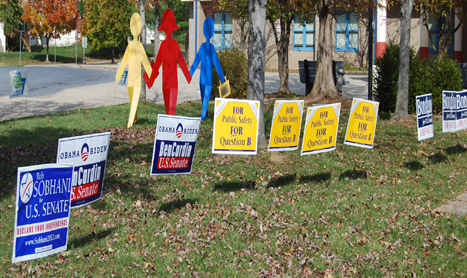COLLEGE PARK – Maryland became the first state in the nation on Tuesday to approve the Dream Act at the ballot box, a law that allows some illegal immigrants to qualify for in-state tuition at public colleges and universities.
With 58 percent of Marylanders voting in favor of the act, Maryland now joins 12 other states that have passed similar laws.
“I feel great,” said Yves Gomes, 20, who emigrated illegally with his parents from India when he was 1. “It feels good knowing I’ll be able to go to school.”
Gomes’ parents were deported in 2009. He hasn’t seen them since, but they’re happy the law passed, he said. He lives with his great aunt and great uncle in Montgomery County.
Gomes was accepted to the University of Maryland, College Park, where he now hopes to attend in the spring and study biochemistry.
“We want a state with smart people,” said Annapolis resident Brand Ginsburgh, 63, who voted in favor of the law Tuesday morning.
Under the law, undocumented high school graduates who can prove they or their parents paid income taxes for three years and have earned 60 credits at a Maryland community college qualify for in-state tuition rates at public two- and four-year colleges. Students also must sign an affidavit stating they’ll apply for a green card, which can take several years. After five years of holding a green card, they can apply for citizenship.
Some voters think undocumented students should go through the entire naturalization process first before receiving benefits.
Nancy Hopper, 76, a retired teacher who has lived in Crownsville for 45 years, voted against the law for this reason.
“They should go through a longer process, which people who have been here and come from other countries have had to do,” she said.
About 400 undocumented students a year will benefit from the law, according to a recent study by the Maryland Institute for Policy Analysis and Research, an independent research center founded by the University of Maryland, Baltimore County.
Until now, Maryland had no statewide laws about tuition rates and immigration status, leaving the power with individual schools and the Maryland Higher Education Commission to decide.
Some voters worry the law would encourage illegal immigration.
“It’s targeting our state for illegal immigration,” said Severna Park resident Mary Collins, 65, who voted against the law. “Other countries have stiff laws against illegals. We just open our doors.”
To others the Dream Act is about only one thing: Education.
“Education is the cornerstone of democracy,” said Annapolis resident Emerson Brooks, 52, who voted in favor of the law. “More education is better than less, always.”
Capital News Service’s Clara Vaughn contributed to this report.

